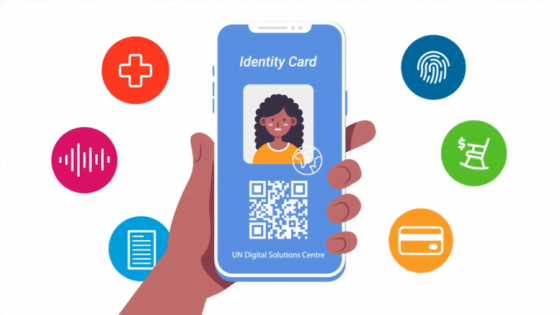This article was originally published by Rhoda Wilson at The Daily Exposé.
New biometrics identity credentials have been proposed or launched around the world as government digital identity schemes continue to roll out.
Previously we wrote about the program Mastercard launched for retailers to use biometric payment methods, like facial recognition and fingerprint scanning. As of May, the program had already gone live in five grocery stores in Sao Paulo, Brazil, with more trials planned for Asia and the Middle East. Mastercard said it planned to roll it out globally later this year.
But it’s not only private companies dictating we use technology they’ll use to track, trace, and control us. From Australia to the Maldives to Uganda, governments are rolling out the WEF / UN digital IDs to usher in a global digitized police state. A state which will police every aspect of our lives.
Australia to “actively explore” a national digital ID system
Australia’s digital and data ministers from the federal government (Commonwealth), and six states and territories agreed to “actively explore” a national digital identification system.
Over the past six years, the federal government has spent about $450 million on a digital identification system but has been delayed by a lack of legislation to expand the system into territories, states, and the private sector.
Australia’s Trusted Digital Identity Bill
“While Australia lacks the corresponding technological infrastructure to utilize a Digital Identity to its sinister potential (such as China’s spying street lights and billboards), this Bill – whether intentional or accidental – acts as the foundation for a China-style Social Credit System,” wrote Senator Malcolm Roberts.
In February, Senator Roberts warned Australians about the “Trusted” Digital Identity Bill in a short video. “The so-called trusted digital identity bill represents a watershed moment in Australian history we stand at the divide between a free personal enterprise future and a digital surveillance age,” he said.
In a speech in Parliament last month, Senator Roberts said:
Instead of working together to push Klaus Schwab’s World Economic Forum plan based on United Nations policies, work together instead for our country. Klaus Schwab’s life by subscription, quote, is really serfdom. It’s slavery. Billionaire globalist corporations will own everything, homes, factories, farms, cars, furniture, and everyday citizens will rent what they need if their social credit score allows.
The plan of the Great Reset is that you will die with nothing. To pull off this evil plan, Klaus Schwab’s World Economic Forum will need to take more than just material possessions from Australians. Senators in this very chamber today who support the Great Reset threaten our privacy, freedom, and dignity. Yes, they’re in this senate chamber.
One Nation vehemently opposes the Great Reset, the Digital Identity Bill, theft of agricultural land use forcing farmers off their land, and all of the Great Reset.
One Nation Has a Plan For A Better Australia, Speech in the Australian Parliament, 27 July 2022
Australia explores digital ID options
This week, The Australian Financial Review published an analysis report of the financial review summit for the Government Services ministry, which oversees Services Australia, Medicare, the National Disability Insurance Agency, and Centrelink (social security).
You can read the report HERE.
Read more: Reclaim the Net, 6 August 2022
Canada and US officials see an opportunity for digital ID after the pandemic
Government officials in Canada and the United States gave their prognosis for how the Covid pandemic altered the direction of digital ID. Canada’s Treasury Board president says the pandemic was an accelerant for broader acceptance of digital ID.
A US congressman, Bill Foster, proposed legislation to promote verified digital ID as a means of clamping down on pandemic-related fraud garnered interest at a congressional hearing on the issue.
After trillions of dollars in pandemic-related aid was dispersed across the U.S., there was also an accompanying rise in the level of fraud. Javelin Strategy & Research found a leap in fraud during the pandemic, totaling $56 billion in 2020 and $52 billion in 2021. Some cases involved biometrics, like spoofs and 2D and 3D masks to bypass facial recognition and liveness checks.
The bill is not Foster’s first attempt at legislating national digital identity.
Read more: Biometric Update, 16 June 2022
Dutch bank CEO proposes turning carbon usage into a tokenized commodity
Barbara Baarsma, CEO of a Netherlands-based bank, created a stir on social media after openly advocating for a communist-style carbon credit system that would tax people for using their freedom of movement rights.
Her carbon credit proposal is a significant advance toward implementing social credit systems that align with the notorious sustainable development goals laid out by the United Nations in its Agenda 2030 “sustainable development goals” (SDGs).
The Agenda 2030 SDGs are what is behind the push to bar farmers from utilizing nitrogen fertilizers and serve as the root of the conflict between Dutch farmers and the government.
Read more: Vision Times, 6 August 2022
Political commentator Eva Vlaardingerbroek spoke to GB News on 3 August about the Dutch banking CEO suggesting ‘carbon wallets’ should be introduced to regulate citizens’ carbon footprints.
Click on the image below to watch the video on Rumble.
The European Union’s digital identity system is ‘Orwellian’
The European Union (“EU”) is moving quickly to adopt a transnational digital identity system. However, the EU proposal came under attack in the European Parliament several months ago for running the risk of replicating Communist China’s social credit system.
European Parliament Member Cristian Terhes said the move was equivalent to the “Chinafication of Europe” where the government acts as the all-encompassing Big Brother who sees everyone, everything, everywhere.
Meanwhile, the EU says that, unlike China’s social credit system, its digital identity platform will only be voluntary.
But skeptics have cast doubts, particularly following the implementation of the Covid-19 passport, which sparked violent protests across Europe. The passport had initially been lobbied as a voluntary and temporary solution to enable ‘safe’ cross-border travel amid the pandemic. Now, it is a mandatory tool that EU officials are mulling extending further.
Read more: Nation First, 5 August 2022
Members of the European Parliament Rob Roos and Rob Rooken explained how the so-called EU “Digital Identity Wallet” works.
“This is what governments and big corporations will do: they will ask for more information than they are currently allowed to. This hollows out our privacy and makes citizens powerless against the government and big corporations.”
If the video above is removed from YouTube you can watch it on Rumble HERE.
The French are fed up with Macron’s Covid tyranny
Despite obvious resistance, within days of Emmanuel Macron’s re-election, France began progressing with the fourth dose of Covid injections for everyone and introduced a “digital identity assurance” app.
Signed into law on 26 April by decree, the Digital Identity Guarantee Service (“SGIN”) is in keeping with a broader trend in the European Union, where more and more countries have started introducing support for some form of digital ID. Luxembourg launched its own mobile ID app in April, while France’s own bill was passed in an effort to comply with the European Commission’s latest Digital Identity guidelines.
Read more: The Exposé, 1 May 2022 and Mobil ID World, 3 May 2022
French president Emmanuel Macron has suffered his first parliamentary defeat of the new term. A bill intended to reinforce Covid restrictions ahead of the autumn was rejected by the three main opposition parties.
Macron was re-elected as president back in April. But just months later in June’s parliamentary elections, he failed to secure a majority. Following this humiliation, Elisabeth Borne, Macron’s prime minister, tried to hand in her resignation. But Macron refused to let her go.
We can expect Macron to use all tools at his disposal to bypass democracy. But make no mistake, this defeat is a major setback.
The defeated bill proposed reinstating certain Covid restrictions, particularly at the French border. Its main aim was to reintroduce the deeply unpopular ‘health pass’ (or vaccine passport) for travellers entering the country. Earlier in the pandemic, a health pass was required to enter cafés and public spaces.
Read more: Spiked Online, 15 July 2022
Greece rolls out digital ‘wallet’ for citizens; ID and driving license now on phone
Greece has rolled out a digital wallet application for its citizens, bringing user experience and services in sync with contemporary life, allowing people to carry their ID and driving license on their mobile phones among others.
The new application “Gov.gr Wallet” providing a virtual wallet on mobile phones was rolling out as of 27 July 2022.
Read more: Greek City times, 28 July 2022
The UK Cinema Association will start accepting the digital ID app from 30 May
Cinemas in the UK will be introducing new digital ID cards for proof of age in adult-rated films.
The UK Cinema Association will start accepting digital ID apps confirming the cinema goer’s age.
Read / Watch more: GB News, 30 May 2022
Vietnam, Kenya, Philippines expanding digital ID uses in different sectors
In October 2021, the high court in Kenya declared illegal the rollout of a biometric ID scheme also known as Huduma Namba.
In the judicial review application, Katiba Institute (the applicant) submitted that the respondents did not conduct a data protection impact assessment (“DPIA”) which was in violation of the KDPA and Order III of the 2020 petition. The court upheld the applicant’s arguments and ordered for a DPIA to be conducted before any further steps to issue Huduma Cards are undertaken.
The relevant ministry has now complied and conducted a DIPA pointing to an acknowledgment of the importance of accountability with regards to sensitive citizen data. As of February 2022, the assessment was not yet public. As the DPIA was the sole requirement to proceed with issuing the Huduma Card, it was expected that the rollout will continue unless further challenges are successfully made, Future Privacy Forum wrote in February 2022.
Read more: 3 News, 14 October 2021 and Future of Privacy Forum, 8 February 2022
The government of Vietnam has highlighted the importance of its population data resource as a tool for creating a digital identity ecosystem where citizens can have access to a variety of public services.
Kenya has announced plans to soon make the controversial Huduma Namba digital ID card a requirement for all digital financial transactions, and in the Philippines, public and private entities are being encouraged to accept the PhilID card as the single source of truth for people’s identity as well as a tool for financial inclusion.
Many elderly citizens in Uganda will soon be able to claim national ID cards as a special campaign has been rolled out by the government to allow them to benefit from a social welfare scheme.
Meanwhile, in the Maldives, a biometric national ID system will soon be in place, according to a government announcement.
Read more: Biometric Update, 1 March 2022
World Economic Forum dystopia
The CovidPass was the brainchild of one of the World Economic Forum’s (“WEF’s”) Young Global Leaders (“YGL”), Mustapha Mokass. It also involved other YGLs across 5 continents, including Muna AbuSulayman and Peggy Liu. CovidPass uses blockchain technology to store encrypted data from individual blood tests.
Read more: Could this COVID-19 ‘health passport’ be the future of travel and events? World Economic Forum, 30 July 2020
By August 2020, it was being called the CommonPass.
In the top left-hand corner of the WEF videos is an Uplink logo. Uplink is the innovation platform of WEF. On WEF’s YouTube channel there are 65 Uplink videos HERE which include topics such as: digital IDs on clothing; innovations to fight Covid; Costa Rica’s carbon tax; 5 ecopreneurs on fighting climate change; and, how carbon markets can help the world reach “net zero.”
By May 2021 the CommonPass was morphing into a “vaccine passport” or “e-vaccination certification of compliance for border crossing regulations.” Denmark was creating a digital Covid-19 “vaccine passport”, which was to be rolled out in the first few months of 2021.
Read more: What is a ‘vaccine passport’ and will you need one the next time you travel? World Economic Forum, 5 May 2021
On 7 March 2022, WEF declared “Covid-19 is with us for good now. Here’s how we should respond.” And produced a video with “8 changes the world needs to make to live with Covid.” The steps include: step up vaccination rates around the world to slow down the emergence of variants worldwide, countries should monitor Covid permanently, strengthen global surveillance, they claim, for infectious diseases and make plans to cope with future waves of Covid.
By the end of March, WEF seems to be openly being presenting the world with a digital ID which was no longer Covid specific. In an article titled ‘Why a ruling on digital ID by Kenya’s High Court has global implications for online privacy’, the World Economic Forum lamented the not so seamless implementation of their digital ID due to the set-back in Kenya.
“For the countries implementing these programmes, the associated benefits come with a host of thorny trade-offs surrounding privacy, security and logistics … Many countries continue to grapple with the legal, regulatory, and ethical boundaries of national identification systems,” the the WEF article stated.
Immediately above an image of the digital ID landscape, WEF stated: “The Kenyan case echoes challenges faced by the EU, the US, and other governing bodies when it comes to the digitization of national ID programs, and the subsequent expectations of privacy for individuals and groups.” We have inalienable rights, not expectations.

Kenya’s digital ID programme, called the National Integrated Identity Management System (NIIMS), was ruled illegal by the highest court because there was no clear documentation of the data privacy risks, nor was there a clear strategy for measuring, mitigating and dealing with those risks.
Related concerns about data privacy and security have arisen in other digital ID platforms as well. For example, India’s Aadhaar is the world’s largest biometric digital ID system.
Registration is linked to biometrics and demographics, and can connect to services including SIM cards, bank accounts, and government aid programmes, making financial systems more inclusive.
Despite these advantages, Aadhaar has seen pushback regarding feasibility and privacy.
Why a ruling on digital ID by Kenya’s High Court has global implications for online privacy, WEF, 31 March 2022
UN digital dystopia
In November 2020, six months after WEF announced their CovidPass, the UN announced its “award-winning solution using blockchain, biometrics and mobile” for employees: A “digital business solution for digital identity management across the UN family.”
The UN DSC, a pilot project of the UN World Food Programme (WFP) and the UN High Commissioner for Refugees (UNHCR), with operational support from UNICC, aims to create a suite of digital solutions that can be shared among UN Agencies to transform common business operations and streamline time-consuming transactional tasks.
In the spirit of emerging technologies supporting the UN Secretary-General’s Strategy on New Technologies, the UN Digital ID is harnessing blockchain, biometrics and mobility, making UN identity verification efficient, secure, transparent, immutable, portable and universal.
The UN Digital ID is a digital wallet for UN personnel, for their personal, Human Resources, medical, travel, security, payroll and pension data kept over time, from onboarding into the UN to parting or retirement.
UN Digital ID – A Building Block for UN Digital Cooperation, UNICC, 13 November 2020
The Covid endgame: Global Governance, “Digital Tyranny” and the Depopulation Agenda
The enforcement of the depopulation agenda requires a socially repressive structure of “global governance” controlled by the financial establishment.
The Worldwide QR Verification Code project lays the groundwork for the instatement of a “Digitised Global Police State” controlled by the financial establishment. It’s part of what the late David Rockefeller entitled “The March towards World Government” based on an alliance of bankers and intellectuals.
Peter Koenig describes the QR Code as: “an all-electronic ID – linking everything to everything of each individual (records of health, banking, personal and private, etc.).”
Consultations are also ongoing between WEF and central banks with a view to implementing a so-called Central Bank Digital Currency (“CBDC”) network. According to David Scripac: “A worldwide digital ID system is in the making. … The aim of the WEF—and of all the central banks [is] to implement a global system in which everyone’s personal data will be incorporated into the Central Bank Digital Currency (CBDC) network.”
In early 2022, the WHO signed a major contract with Deutsche Telekom T Systems to develop a QR Verification App and Software which is to be applied Worldwide.
The QR code-based software solution is slated to be used: “for other vaccinations as well, such as polio or yellow fever, T-Systems said in a statement … adding that the WHO would support its 194 member states in building national and regional verification technology.”
According to a Deutsche Telekom I-T Systems Communique: “The WHO’s gateway service also serves as a bridge between regional systems, “which essentially implies a coordinated global structure of QR surveillance, which oversees the entire population of Planet Earth.
And once established: it will police “every aspect of our lives”, wherever our location. “It can also be used as part of future vaccination campaigns and home-based records.”
Read more: Global Research, 30 July 2022











0 Comments